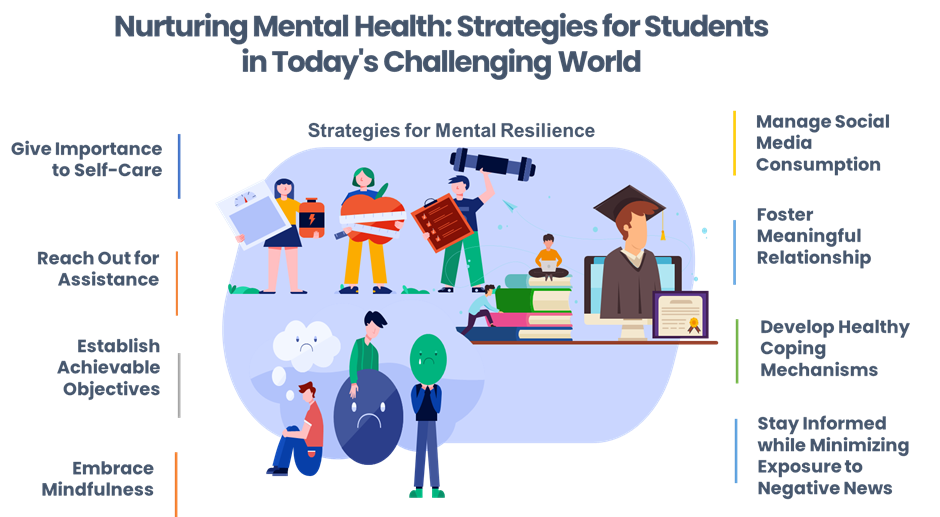From the relentless pursuit of academic excellence to the ever-growing influence of social media, today's students face a myriad of stressors that can significantly impact their mental health.
The modern student has several problems that might have a negative impact on their mental health. Academic strain, financial stress, social isolation, and the continual flood of information from digital platforms are just a few of the reasons contributing to students' developing mental health issues. Furthermore, the ongoing COVID-19 epidemic has worsened these issues, causing young people to experience heightened worry, sadness, and loneliness.
Despite these formidable obstacles, there are various proactive measures students can implement to protect their mental well-being and cultivate resilience in challenging situations.
Give Importance to Self-Care
Ensure self-care is an essential part of your daily schedule. This involves ensuring you get sufficient sleep, follow a balanced diet, participate in regular exercise, and allocate time for relaxation and interests.
Reach Out for Assistance
Don't hesitate to seek assistance when necessary. Whether it involves confiding in friends, family members, or consulting a mental health professional, asking for support demonstrates resilience and self-awareness.
Establish Achievable Objectives
While aiming for excellence is commendable, it's essential to set attainable goals and maintain realistic expectations. Break down larger tasks into manageable steps, and acknowledge and celebrate your progress along the way.
Embrace Mindfulness
Incorporate mindfulness into your routine through activities like meditation, deep breathing exercises, or yoga. Practicing mindfulness can alleviate stress, enhance focus, and promote overall mental well-being.
Manage Social Media Consumption
Be mindful of the time spent on social media and its effect on your mental well-being. Establish boundaries for screen time, unfollow accounts that cause negative feelings, and prioritize offline connections over virtual interactions.
Foster Meaningful Relationship
Nurture meaningful relationships with friends, family, and peers. Engage in activities that promote a sense of belonging and community, such as joining clubs, participating in volunteer work, or attending social gatherings.
Develop Healthy Coping Mechanisms
Identify healthy coping strategies to manage stress and challenges effectively. This may include activities like journaling, listening to music, pursuing creative outlets, or practicing relaxation techniques.
Stay Informed while Minimizing Exposure to Negative News
Stay updated on current events, but limit exposure to distressing news that may impact your mental health negatively. Take breaks from constant news consumption and focus on activities that bring joy and fulfilment.
Navigating all the challenges of student life in today's demanding environment necessitates an active commitment to mental health and well-being. Students may grow resilience and flourish in the face of hardship by prioritizing self-care, seeking assistance, setting realistic objectives, practicing mindfulness, connecting with others, and creating good coping mechanisms. Remember, your mental health is important, and it is OK to put it above all else.










